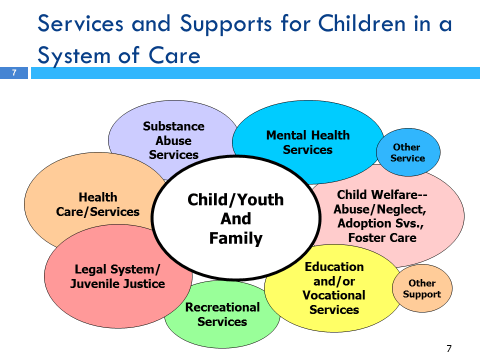The web Browser you are currently using is unsupported, and some features of this site may not work as intended. Please update to a modern browser such as Chrome, Firefox or Edge to experience all features Michigan.gov has to offer.
Mental Health Partnerships
To build a system of care for children, we work with partners in education, juvenile justice, early care & primary care.

Partnerships to build a System of Care
To facilitate the development of a system of care the Division of Mental Health Services to Children and Families partners with state and local organizations to ensure children with serious emotional disturbances and their families are able to access needed services and supports in their community.
Mental Health Partnerships
-
CMHSP Key Contacts for Youth/Young Adult Reentry-Juvenile Justice
-
CMHSP/PIHP Key Contacts for Youth/Young Adult Reentry-CHILD WELFARE
-
SED Waiver
-
Suicide Prevention
Suicide can be the tragic result of many complex factors. Suicide is preventable. There is always hope. Michigan residents can connect with us for a variety of resources regarding suicide prevention. Please visit the MDHHS Suicide Prevention page for information on coalitions, communication tools, fact sheets, resources and trainings.
 If you are in crisis, or know someone who needs help, contact the National Suicide Prevention Lifeline NOW at: 1-800-273-TALK (8255)
If you are in crisis, or know someone who needs help, contact the National Suicide Prevention Lifeline NOW at: 1-800-273-TALK (8255)
www.suicidepreventionlifeline.org -
Integration of Behavioral Health in Pediatric Primary Care
Primary and behavioral care integration is a rapidly emerging avenue for improving healthcare quality. A key strategy for integration is the addition of behavioral health providers, often called Behavioral Health Clinicians (BHCs), in primary care settings. Although care integration initiatives vary considerably in their approaches, many are placing BHCs directly into physician practices as a cost-effective approach to patient-centered care.
The goal of an integrated care intervention is to improve a child’s functioning in the context of routine medical care. Integrating behavioral health services into primary care can improve health and wellbeing by:
- identifying and responding to behavioral issues that affect health status, such as childhood trauma;
- educating and skill building for children, youth, and families around managing physical conditions; and
- consulting with medical providers on the impact and management of behavioral health issues.
-
Michigan Child Collaborative Care
Michigan Child Collaborative Care (MC3) is a care model to increase access to mental health treatment for underserved children and adolescents and high-risk perinatal women in 83 counties in Michigan. The program includes:
- “Just-in-time” phone consultation to primary care providers and tele-psychiatry consultation to children and adolescents and high-risk perinatal women.
- Behavioral Health Consultants (BHCs) to assist with recruitment of primary care providers for enrollment in MC3, linking with the primary care providers to facilitate phone consultation with Child and Adolescent Psychiatrist as well as arrange for tele-psychiatry (assessment).
- BHCs are embedded in selected large primary care practices to assist with the implementation of standardized mental health screening and assessments; provide psycho-education to parents and youth; provide brief mental health interventions; and link the child/family to local resources as well as follow up referrals to behavioral health services.
- Panel reviews for the larger primary care practices so that providers can get consultation from psychiatrists on multiple patients in a scheduled hour.
- Webinars and live educational sessions for primary care practices based on their identification of topics of interest.
MC3-Connect is a five-year project funded by the Health Research and Services Administration. A collaborative relationship between MDHHS, the University of Michigan, and Michigan State University is used to carry out the four goals of MC3-Connect:
- EXPAND MC3 phone-based, tele-psychiatric, group case consultations and behavioral health consultant support (BHC) to all 83 Michigan counties and to 70 school-based health centers (CAHCs), including the Upper Peninsula, Thumb Region, and tribal populations
- EDUCATE providers and pediatric residents by developing a series of culturally sensitive and content relevant webinars based on requested topics.
- LINK MC3 to other evidence-based (EB) intervention programs supported by MDHHS, University of Michigan (UM) and Michigan State University (MSU) to facilitate access and coordinate follow up care to for women/children in underserved and rural areas without specialty services.
- Integrate SCREENING AND REFERRAL with workflow processes primary care and school-based health centers and provide MC3 as a resource.
- One collaborative effort to educate providers was the creation of a short video on how providers can engage with parents and youth when discussing behavioral health. This content for this video was created by a pediatrician and the executive director of the Association for Children’s Mental Health. Members of both the Parent Advisory Committee (PAC) and Youth Advisory Committee (YAC) from the Association of Children’s Mental Health provided feedback on the video to ensure parent and youth voice were adequately captured. You can view the video here.